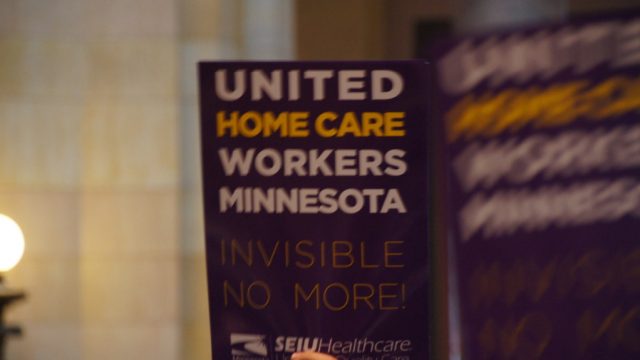Privacy concerns surface in massive MN public employee union drive

By Tom Steward | Watchdog Minnesota Bureau
SIGN HERE: SEIU organizers are using personal information provided by MN officials under law to contact 26,000 home care assistants in what would be the biggest public employee union election in MN history, state officials say.
TWIN CITIES, Minn. — Paula Jacobs didn’t realize a union drive, aimed at home personal-care assistants, was under way.
Until an organizer for the Service Employees International Union knocked on her door.
“Total strangers, they know about you. They know your name,” said Jacobs, who left her job to care for a family member with special needs.
She gets state payments to help with the care.
“It just freaked me out. I knew nothing about it. I was totally blindsided by it.”
Jacobs got worried, unnerved. Not by anything the organizer did, but rather by the uncertainty of the situation. Shook up, she filed a complaint with the Office of the Minnesota Attorney General.
“You don’t know if that’s a safe person, you don’t know if they’ve had background checks. They don’t like to be told no, so … the whole experience was really creepy,” said Jacobs.
How did SEIU get her name? What else did they know about her and the family member she cares for? After all, the third-party agency that handles her payroll transactions with the state always stressed confidentiality and privacy.
“When you are hired as a PCA (personal care assistants), you’re signing all these forms saying you won’t talk anything about the client. Then you have somebody showing up at the door?” said Jacobs, who also received phone calls and mailed solicitations. “They know there’s a vulnerable adult somewhere because the state law requires that they be watched in their home … and that should be protected information because they’re so vulnerable.”
A former union member herself, Jacobs said she opposes this particular local on the grounds that dues payments would come at the expense of her family member’s care.
“They only have a set amount of dollars as it is, and it’s going to hurt them in the long run,” she said.
Attempts to reach SEIU representatives were unsuccessful, but other home-care workers said they welcomed the organizers.
“I forgot to send the card in and I had someone show up at my house who’s a local PCA and I just signed it for her,” said Samantha Hammill, a Twin Cities home-care assistant who submitted a card favoring a union election. “I’ve talked to PCA’s who are for it. It’s just we haven’t got clear … details on how the union would be formed, what we would be getting out of it.”
The state collected and released to the SEIU in March some 26,000 personal care assistants’ names and addresses, a Watchdog Minnesota Bureau inquiry found. The Minnesota Department of Human Services told Watchdog Minnesota the agency has “received a number of complaints about this.”
“The state had to go to some extent to collect these names because they weren’t in a handy-dandy database,” said Josh Tilsen, commissioner of the Minnesota Bureau of Mediation Services that would hold a potential union election. “… It was the Department of Human Services that had to get the list together. The law specifies and directs the DHS to go ahead and do that. Then when the union petitioned, it directed us to get it from DHS and get it to (the SEIU), which we did when they filed about six or eight weeks ago.”
The action was allowed under fiercely debated 2013 legislation passed on a party-line vote authorizing union elections for personal-care attendants and subsidized child-care providers.
“I’m well aware of the concerns because they were articulated real explicitly during the debate over the bill,” Tilsen said.
Watchdog Minnesota obtained a December 2013 DHS directive with the subject line “Action Required for Continued Payment” that ordered third-party PCA agencies to “report data about personal care assistants who have paid within the previous six months.”
It gave agencies one month to provide PCA personal information or else not get paid. Another directive instructed agencies to submit a revised agreement, which, for the purposes of forming a union, “the participant is considered the employer and has the authority to direct and control the work of the individual(s) performing direct support services including by hiring, discharging, scheduling and supervising”.
SEIU needs to submit about 7,800 signatures — 30 percent — of eligible personal-care assistants to force what would be the biggest public employee union vote in Minnesota history. If a vote occurs, BMS will hold a mail election, with ballots sent to workers’ homes.
So what happens to personal care assistants’ personal information that’s shared with SEIU?
“What do they do with it when they’re done with it? Is it protected or secured so that it doesn’t go to somebody else?” asks Jacobs. “They say the union has the right, but what do they do with it once they’ve got all our information?”
And then …
“As to the question of what happens to it afterward, I do not know the answer to that question,” said Tilsen. “… There just isn’t anything that answers the question, once the union organizing campaign is over.”
Contact Tom Steward at tsteward@watchdog.org







